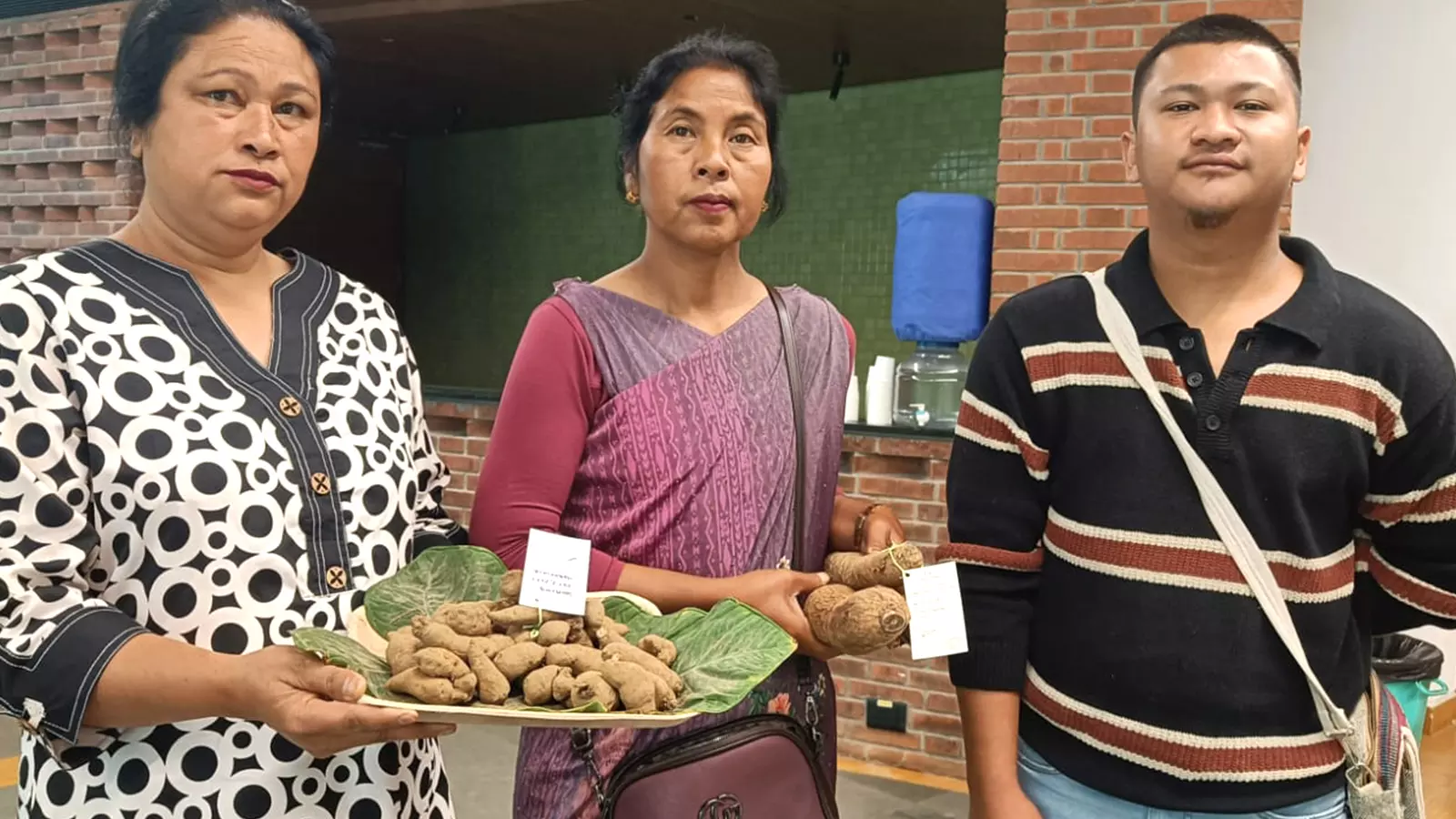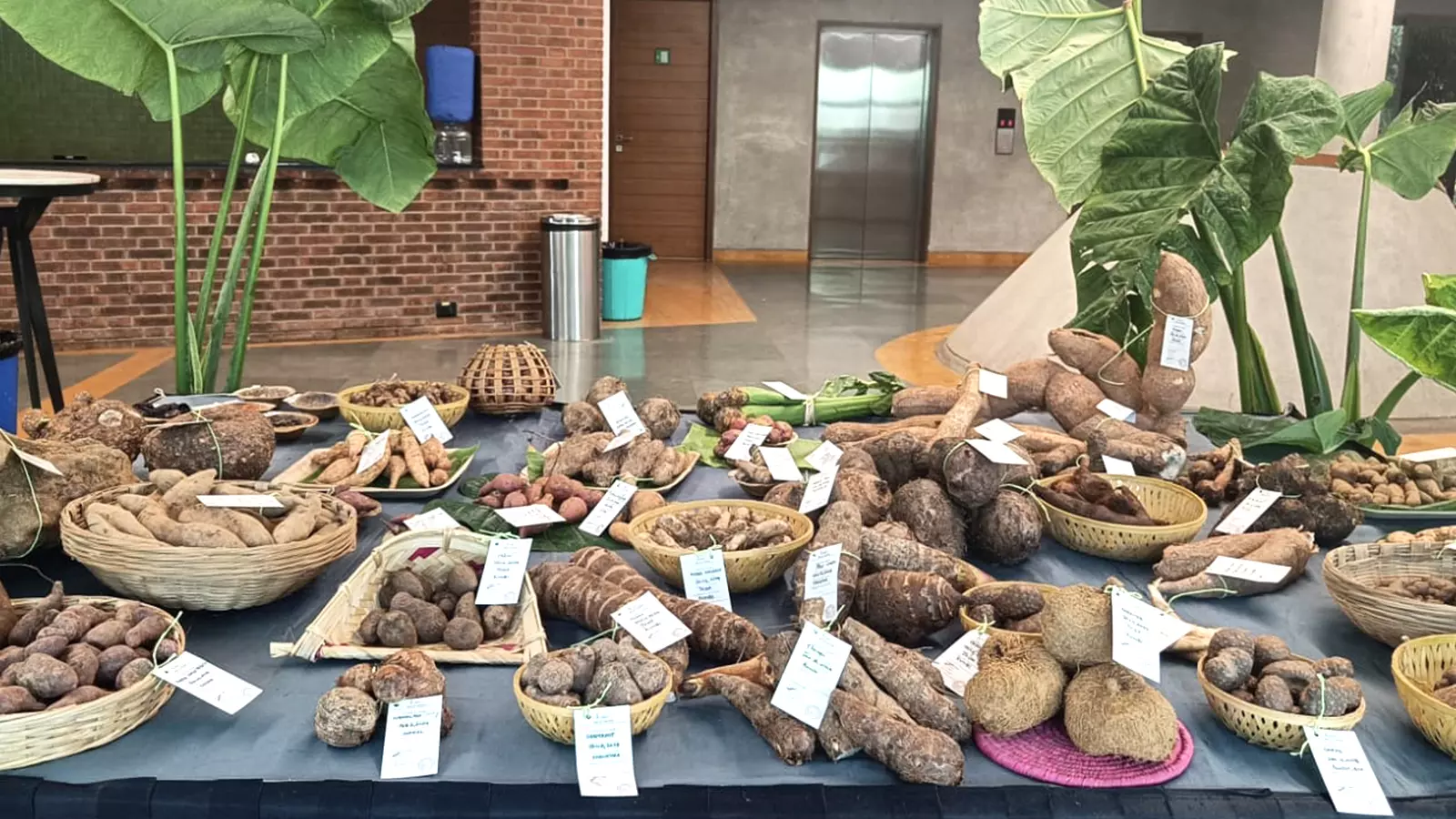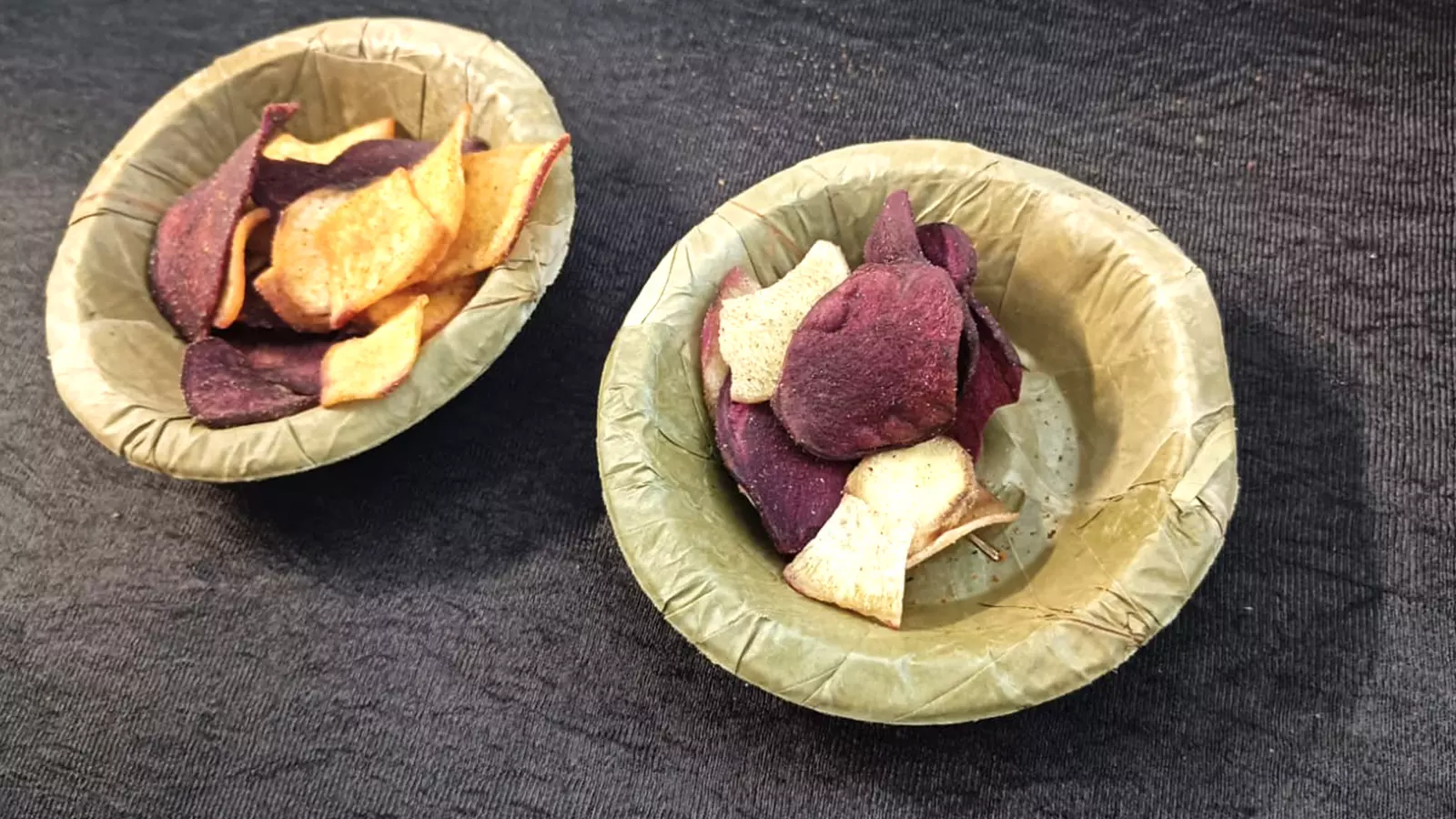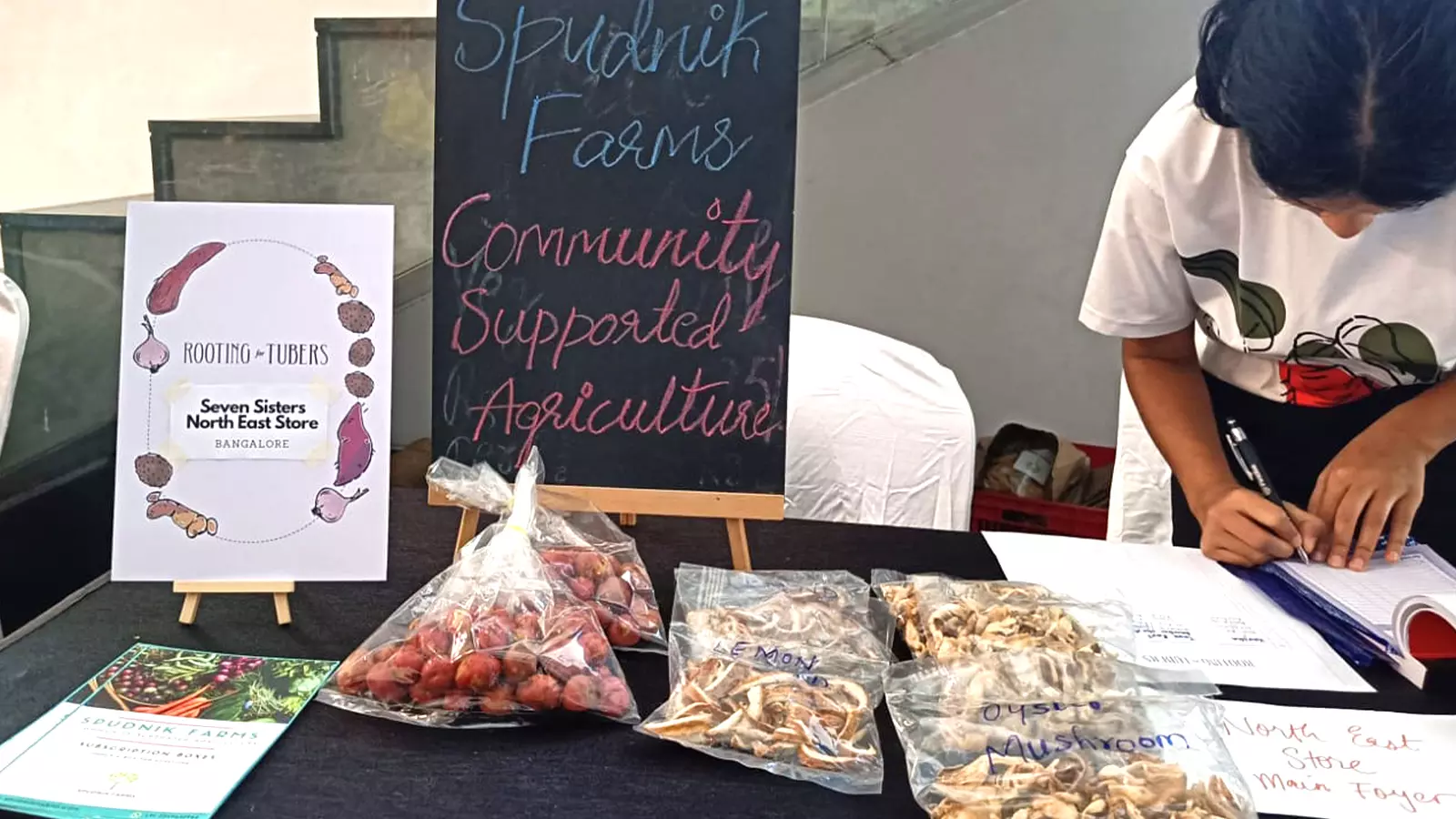
- Home
- India
- World
- Premium
- THE FEDERAL SPECIAL
- Analysis
- States
- Perspective
- Videos
- Sports
- Education
- Entertainment
- Elections
- Features
- Health
- Business
- Series
- In memoriam: Sheikh Mujibur Rahman
- Bishnoi's Men
- NEET TANGLE
- Economy Series
- Earth Day
- Kashmir’s Frozen Turbulence
- India@75
- The legend of Ramjanmabhoomi
- Liberalisation@30
- How to tame a dragon
- Celebrating biodiversity
- Farm Matters
- 50 days of solitude
- Bringing Migrants Home
- Budget 2020
- Jharkhand Votes
- The Federal Investigates
- The Federal Impact
- Vanishing Sand
- Gandhi @ 150
- Andhra Today
- Field report
- Operation Gulmarg
- Pandemic @1 Mn in India
- The Federal Year-End
- The Zero Year
- Science
- Brand studio
- Newsletter
- Elections 2024
- Events
Northeast women farmers defy the odds to dig deeper for roots and tubers

Farming has never been an easy occupation for Arelcy Lyngdoh and Laitlin Lyngdoh from Meghalaya. Despite the odds, for three decades, the two among hundreds of indigenous women farmers from the northeastern state, have dedicated their lives to growing tuber crops.In their farmlands in Meghalaya’s West Khasi hills, they grow, harvest and sell tuber crops like tapioca, sweet potato,...
Farming has never been an easy occupation for Arelcy Lyngdoh and Laitlin Lyngdoh from Meghalaya. Despite the odds, for three decades, the two among hundreds of indigenous women farmers from the northeastern state, have dedicated their lives to growing tuber crops.
In their farmlands in Meghalaya’s West Khasi hills, they grow, harvest and sell tuber crops like tapioca, sweet potato, Lakadong turmeric (named after the Lakadong area of Meghalaya’s Jaintia Hills), yam and sohphlang (flemingia vestita) to earn their livelihood.
Arelcy and Laitlin, during their recent visit to Bengaluru, Karnataka's capital city, to attend an event on tuber crops from across India, told The Federal that climate change and lower margins were the biggest hurdles they faced as farmers.
Female farmers who are fighters
“Growing tuber crops requires a lot of hard work. As farmers, we earn the bare minimum to keep our household running. Over the years, climate change has affected the quality and quantity of our yield,” added Arelcy.

Arelcy Lyngdoh (left), Laitlin Lyngdoh (centre) and Kennyson Lyngdoh (right) pose for the camera as they promote Meghalayas tuber crops. Photos: Maitreyee Boruah
Agricultural scientists say climate change has already heralded in the northeastern part of India with erratic weather, abrupt rising temperature, deficiency in rainfall, humidity variation and increased unpredictability of weather. The changing climate in Meghalaya has impacted agriculture, water resources, forests and biodiversity.
“Agriculture in Meghalaya depends on rains. With variation and unpredictability of rain patterns in the state, farmers are facing huge insecurity,” informed Laitlin.
Some other issues faced by farmers who grow tuber crops are the high cost of planting materials, the requirement of a large workforce, digging on hill slopes causes heavy soil erosion, the produce can’t be stored for a longer period, the lack of processing and value addition system and tuber crops are usually consumed by tribals or poor and thus there is no market.
However, the indigenous women farmers are determined to continue farming their crops — a livelihood source they have inherited from their ancestors. In doing so, they keep alive the age-old custom of growing, cooking and eating indigenous food of the northeastern state rooted in their traditions.

A table with tubers from across India was on display in Bengaluru.
They are also the foot (rather food) soldiers who are promoting sustainable, organic, high resilience and nutritional tuber crops that scientists call “future smart crops”. “We will never discontinue growing tuber crops in our farms. It is a part and parcel of our tribal life. We want to promote the culture of eating tubers, which have high nutritional value, among the urban population,” said Arelcy.
Talking about why despite the challenges, farmers in Meghalaya cultivate tuber crops, Laitlin said the soil and climatic conditions of the entire northeastern region highly favour yam, taro and sweet potato production. “We have a rich biodiversity of tuber crops in the region. Tuber crops are an integral part of the food of tribals, these crops require less care and can be grown on marginal land,” she added.
India is home to rich and diverse tropical root and tuber crops, especially in the Western Ghats and North Eastern Himalayas. Tubers are consumed by both humans and animals. They are also used in industrial units and have high medicinal values.
An experience to cherish
Both Arelcy and Laitlin were “overwhelmed” by the response they received in Bengaluru during the day-long programme titled, “Rooting for Tubers”, on Sunday. Tuber crops grown by indigenous communities of Kerala, Karnataka, Tripura, Manipur, Odisha and Meghalaya were displayed at the event for visitors to appreciate food sources in their rawness.
Food connoisseurs were also treated with local delicacies using unique tubers, vegetables and produce from across India. The food festival was organised by Spudnik Farms, a collective of organic farmers across Karnataka.

Chips made from tuber crops.
For Arelcy and Laitlin, it was their maiden visit to Bengaluru. “We never thought city dwellers would be so interested in the local food sources and delicacies from far-flung Meghalaya. As we shared our experiences and knowledge with all, we also learnt a lot about the value of networking to help promote and sell our produce,” said Arelcy.
They usually sell their tuber crops in local markets of Meghalaya and neighbouring Assam.
A collective for women farmers
Both of them are part of a collective of women farmers from Meghalaya supported by Shillong-based NGO, Grassroot. The NGO works closely with women farmers of the state to teach them about integrated farming systems and strengthen women’s voices in land resources and governance.
Kennyson Lyngdoh, a member of Grassroot who accompanied the women farmers to Bengaluru, said the idea behind their visit to the city was to popularise tuber crops. “We want the women farmers of Meghalaya to have a profitable source of income by growing tuber crops. The state produces some of the best tuber crops. Unfortunately, the farmers don't have a big market to sell them,” said Kennyson.
Women farmers are yet to get their due
It is estimated that 80 per cent of the population (estimated 39 lakh people) of Meghalaya resides in rural areas. The village dwellers primarily depend on agriculture and allied services for their livelihood. According to North East Network (NEN), a women’s rights organisation, women play a crucial role in ensuring the sustainability of rural households and communities in North East India.
“They make significant contributions to agricultural production, food security and nutrition, land and natural resource management and building climate resilience. Despite their significant role, they lack recognition as farmers and face structural barriers related to land ownership, access to resources and markets, which are associated with high levels of gender discrimination and gender-based violence.
“Women do most of the manual labour and are involved in animal husbandry activity. However, their work in agriculture and other allied activities is seen as synonymous with domestic work, which again is accounted as unpaid work,” stated NEN.

Grow, eat and enjoy like Northeast India: Produce from the region at display.
“Meghalaya is a matrilineal society where familial relationships can be traced through a female; an indigenous custom that has been followed since time immemorial. However, the decision-making at the political and household level lies with the male member.
“These also include decisions on the land and other natural resources. We are working to empower women farmers through our various works," said Kennyson.
“For all our projects, we work closely with women self-help groups existing in the area/s. We follow the traditional governance system of the area to better understand the situation from both a male and female perspective,” he added.
Dr P Sethuraman Sivakumar, principal scientist (agriculture extension), ICAR-Central Tuber Crops Research Institute, Thiruvananthapuram, Kerala said tuber crops play a crucial role in the food and nutritional security of the people living in the northeastern region of the country. The Kerala-based research institute works closely with tuber growers in Meghalaya, Tripura, Manipur and Nagaland.
“The institute is working to enhance food security and sustainable livelihoods in the region through tuber crops technologies. The women farmers of the region play a big role in carrying forward our work,” added Sivakumar. The institute has adopted 10 villages in the four northeastern states where it works with more than 200 farmers.
